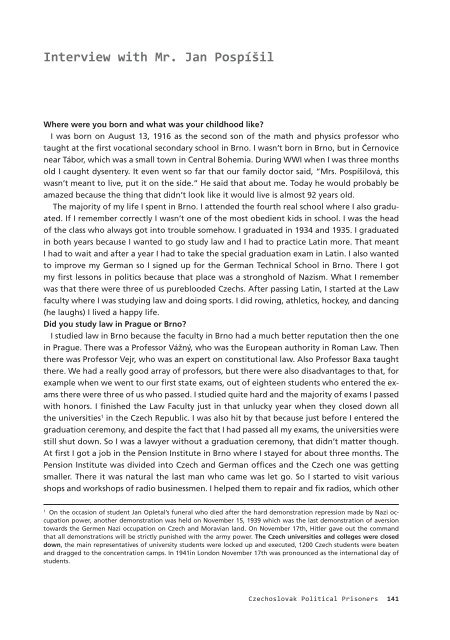Czechoslovak Political Prisoners - über das Projekt Political ...
Czechoslovak Political Prisoners - über das Projekt Political ...
Czechoslovak Political Prisoners - über das Projekt Political ...
Create successful ePaper yourself
Turn your PDF publications into a flip-book with our unique Google optimized e-Paper software.
Interview with Mr. Jan Pospíšil<br />
Where were you born and what was your childhood like?<br />
I was born on August 13, 1916 as the second son of the math and physics professor who<br />
taught at the first vocational secondary school in Brno. I wasn’t born in Brno, but in Černovice<br />
near Tábor, which was a small town in Central Bohemia. During WWI when I was three months<br />
old I caught dysentery. It even went so far that our family doctor said, “Mrs. Pospíšilová, this<br />
wasn’t meant to live, put it on the side.” He said that about me. Today he would probably be<br />
amazed because the thing that didn’t look like it would live is almost 92 years old.<br />
The majority of my life I spent in Brno. I attended the fourth real school where I also graduated.<br />
If I remember correctly I wasn’t one of the most obedient kids in school. I was the head<br />
of the class who always got into trouble somehow. I graduated in 1934 and 1935. I graduated<br />
in both years because I wanted to go study law and I had to practice Latin more. That meant<br />
I had to wait and after a year I had to take the special graduation exam in Latin. I also wanted<br />
to improve my German so I signed up for the German Technical School in Brno. There I got<br />
my first lessons in politics because that place was a stronghold of Nazism. What I remember<br />
was that there were three of us pureblooded Czechs. After passing Latin, I started at the Law<br />
faculty where I was studying law and doing sports. I did rowing, athletics, hockey, and dancing<br />
(he laughs) I lived a happy life.<br />
Did you study law in Prague or Brno?<br />
I studied law in Brno because the faculty in Brno had a much better reputation then the one<br />
in Prague. There was a Professor Vážný, who was the European authority in Roman Law. Then<br />
there was Professor Vejr, who was an expert on constitutional law. Also Professor Baxa taught<br />
there. We had a really good array of professors, but there were also disadvantages to that, for<br />
example when we went to our first state exams, out of eighteen students who entered the exams<br />
there were three of us who passed. I studied quite hard and the majority of exams I passed<br />
with honors. I finished the Law Faculty just in that unlucky year when they closed down all<br />
the universities 1 in the Czech Republic. I was also hit by that because just before I entered the<br />
graduation ceremony, and despite the fact that I had passed all my exams, the universities were<br />
still shut down. So I was a lawyer without a graduation ceremony, that didn’t matter though.<br />
At first I got a job in the Pension Institute in Brno where I stayed for about three months. The<br />
Pension Institute was divided into Czech and German offices and the Czech one was getting<br />
smaller. There it was natural the last man who came was let go. So I started to visit various<br />
shops and workshops of radio businessmen. I helped them to repair and fix radios, which other<br />
1 On the occasion of student Jan Opletal’s funeral who died after the hard demonstration repression made by Nazi occupation<br />
power, another demonstration was held on November 15, 1939 which was the last demonstration of aversion<br />
towards the Germen Nazi occupation on Czech and Moravian land. On November 17th, Hitler gave out the command<br />
that all demonstrations will be strictly punished with the army power. The Czech universities and colleges were closed<br />
down, the main representatives of university students were locked up and executed, 1200 Czech students were beaten<br />
and dragged to the concentration camps. In 1941in London November 17th was pronounced as the international day of<br />
students.<br />
<strong>Czechoslovak</strong> <strong>Political</strong> <strong>Prisoners</strong> 141


